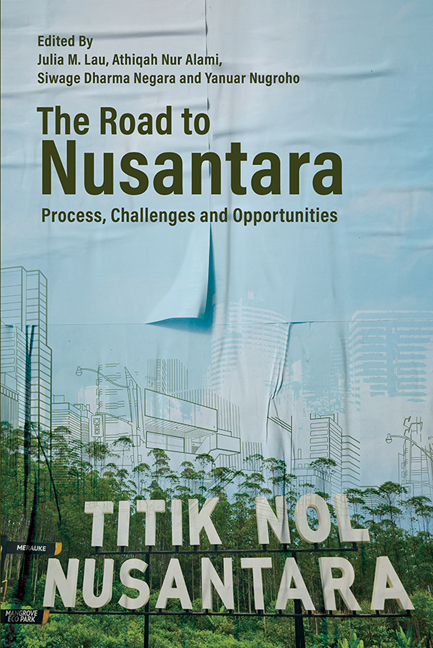Book contents
- Frontmatter
- Contents
- List of Figures
- List of Tables
- Foreword
- Foreword
- The Contributors
- Glossary
- Introduction: The Road to Nusantara—Process, Challenges and Opportunities
- PART I PROCESSES AND PATHWAYS TOWARDS NUSANTARA
- PART II CHALLENGES IN DEVELOPING NUSANTARA
- PART III OPPORTUNITIES FOR NUSANTARA
- Conclusion: Shaping Nusantara
- Index
3 - Nusantara and the Spatial Implications for the Practice of Indonesian Democracy
Published online by Cambridge University Press: 01 March 2024
- Frontmatter
- Contents
- List of Figures
- List of Tables
- Foreword
- Foreword
- The Contributors
- Glossary
- Introduction: The Road to Nusantara—Process, Challenges and Opportunities
- PART I PROCESSES AND PATHWAYS TOWARDS NUSANTARA
- PART II CHALLENGES IN DEVELOPING NUSANTARA
- PART III OPPORTUNITIES FOR NUSANTARA
- Conclusion: Shaping Nusantara
- Index
Summary
INTRODUCTION
The plan to move Indonesia's national capital from its historic site in Jakarta to a new purpose-built city in East Kalimantan Province is undoubtedly the most ambitious state infrastructure project of modern Indonesian history in terms of scale, logistics and cost. It has understandably provoked divergent responses, from praise as a visionary attempt to reimagine and modernize the nation, to criticism of the massive expenditure required and its environmental impacts, and scepticism that it is driven by political interests. Beyond issues of the economic and logistical feasibility of the plan's implementation at a time of investor wariness and economic uncertainty, significant questions emerge regarding how a purpose-built capital will impact the ways that Indonesia's national politics is imagined and conducted.
Purpose-built capitals are by no means a new or unique phenomenon. There have been twelve capital cities built since the 1960s, with several others underway or in pre-planning stages. Pojani notes that, regardless of whether the political setting is democratic, a hybrid regime or authoritarian, new capital cities have been almost entirely planned by those in power as “totalizing projects”, rather than being developed and built piecemeal over time through processes involving a range of social political and economic interests. This has generally resulted in a tendency for purpose-built capitals to reinforce and embody state and elite conceptions and “utopian” visions, of nation, state and spatializations of political order. In particular, the crucial role played by non-state and civil society actors in shaping political praxis and popular resistance in capital cities has often been omitted, by oversight or intent, from this state or elite vision, such as in Myanmar's junta-built capital of Naypyidaw or Nursultan, Kazakhstan's capital named after its former autocratic president.
This chapter will reflect upon two central questions in considering the implications of Nusantara for political praxis in Indonesia. The first is historical: What has been the relationship among space, rakyat and political change in Jakarta, the nation's capital and biggest city? Particular attention is given to the centrality of Jakarta's streets as political space, producing social and political movements and dialectical tensions that have shaped and constrained the political direction of the nation-stat
- Type
- Chapter
- Information
- The Road to NusantaraProcess, Challenges and Opportunities, pp. 52 - 74Publisher: ISEAS–Yusof Ishak InstitutePrint publication year: 2023

